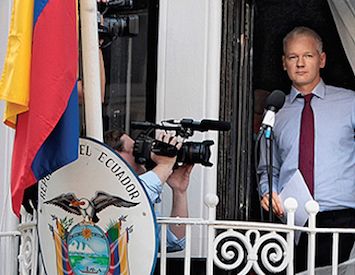Moreno's election win in Ecuador means Julian Assange gets to stay and the march of the right has been arrested. Alan Austin reports.
HARD TO SAY who is happiest at the failure of Ecuador’s right wing party to topple the leftist government in the election at the weekend.
Julian Assange gets to stay in his London hidey-hole. The march of the right in Latin America – and the world – has been arrested. And Australian beekeepers will still sell honey to Ecuadoreans.
Preliminary results suggest the ruling centre left Alianza Pais (Proud and Sovereign Fatherland) coalition, led by Lenin Moreno will stave off the challenge by the right-wing Creando Oportunidades (Creating Opportunities), led by Guillermo Lasso. Moreno, 63, was vice president to the incumbent Rafael Correa who is constitutionally obliged to retire.
The presidential voting system – as in many Latin American and European democracies – is first past the post with a run-off election if no candidate gets the required majority. In Ecuador, this is 40% of the vote, with a 10% lead over whoever comes second.
Currently, Moreno has 39.2% and Lasso 28.4% with 94% of the vote counted. As Moreno is just shy of 40%, a run-off in April looks likely.
Australian founder of WikiLeaks, Julian Assange, will be greatly relieved as Lasso’s pro-U.S. party has promised to evict Assange from Ecuador’s London Embassy. The computer hacker and whistleblower has been holed up there since 2012, following attempts to extradite him to Sweden and then to the USA.
Moreno has said Assange can stay in the Embassy, but has stipulated that he is:
" ... not to intervene in the politics of countries that are friends of Ecuador."
Before the November U.S. election, the attitude of Donald Trump’s camp towards Assange contrasted with Hillary Clinton’s in Assange’s favour. Last year, Ecuador was pressured by the Obama administration to cut off Assange’s internet access at their London embassy. This followed WikiLeaks releasing thousands of emails damaging to Obama and Clinton, as IA reported in detail in November.
Of course, now Trump is president, there is no telling what the new administration’s stance will be. Assange will have observed current White House volatility and unpredictability as closely as anyone. Just in the last week, Trump has fabricated an incident in Sweden, has been revealed to be unable to live in the White House and has had a retired vice-admiral decline his offer to replace Michael Flynn, who was forced to resign after revelations that he had misled the vice-president about his links with Russia.
Observers who anticipated the right would march on to victory in Ecuador – as has happened in Argentina, Peru, the USA and Chile’s local elections, and is predicted for this year’s European elections – have been proven wrong.
Whether the new U.S. Government’s disarray was a factor in rejecting the right in Ecuador is impossible to judge. But the global momentum rightwards seems to have been slowed, if not stopped or reversed.
An intriguing aside in this election is that Moreno has campaigned from a wheelchair after losing the use of his legs when shot in a 1998 robbery. If he wins, he will join a very exclusive group of history’s paraplegic national leaders.
Impact on Australia if the incumbent party is returned will be minimal. Had there been a change, there may have been trade shifts in line with Lasso’s promises to move Ecuador closer to the USA. By this, he means away from Asia, and particularly China, which has enjoyed closer links recently.
Ecuador’s position in Latin America has parallels to Australia’s in South East Asia. Small population – 17 million – resource-rich, reliant on minerals exports, with federal politics dominated by two parties — one pragmatic centre left and the other more pro-capitalist right wing, and with frequent coalitions.
Economic similarities include mixed free enterprise economies, high employment, chronic budget deficits, expanding debt and reliance on trade with China.
Australia and Ecuador are both members of the Asia-Pacific Parliamentary Forum, the Forum for East Asia-Latin America Cooperation and several other multilateral groups. Ecuador is not an APEC member, but has applied to join.
The main recent shift in trade links is the expanded education of Ecuadorean students in Australian institutions. Australia also currently exports paper, aluminium, sugars and honey to Ecuador. Imports include animal feed, vegetables, cocoa, and canned and preserved fruit.
Significant differences are that Ecuador is geographically smaller and much poorer in both income and wealth. It also has a dramatically contrasting policy towards asylum for Australia’s Julian Assange.
The election is not all over, despite Moreno’s current lead. If he fails to get 40% and then a majority of the losing parties back Lasso in the second round, Lasso will win.
The final first round count should be known Thursday, Australian time.
You can follow Alan Austin on Twitter @AlanTheAmazing.

This work is licensed under a Creative Commons Attribution-NonCommercial-NoDerivs 3.0 Australia License
Monthly Donation
Single Donation
Keep up! Subscribe to IA for just $5.











